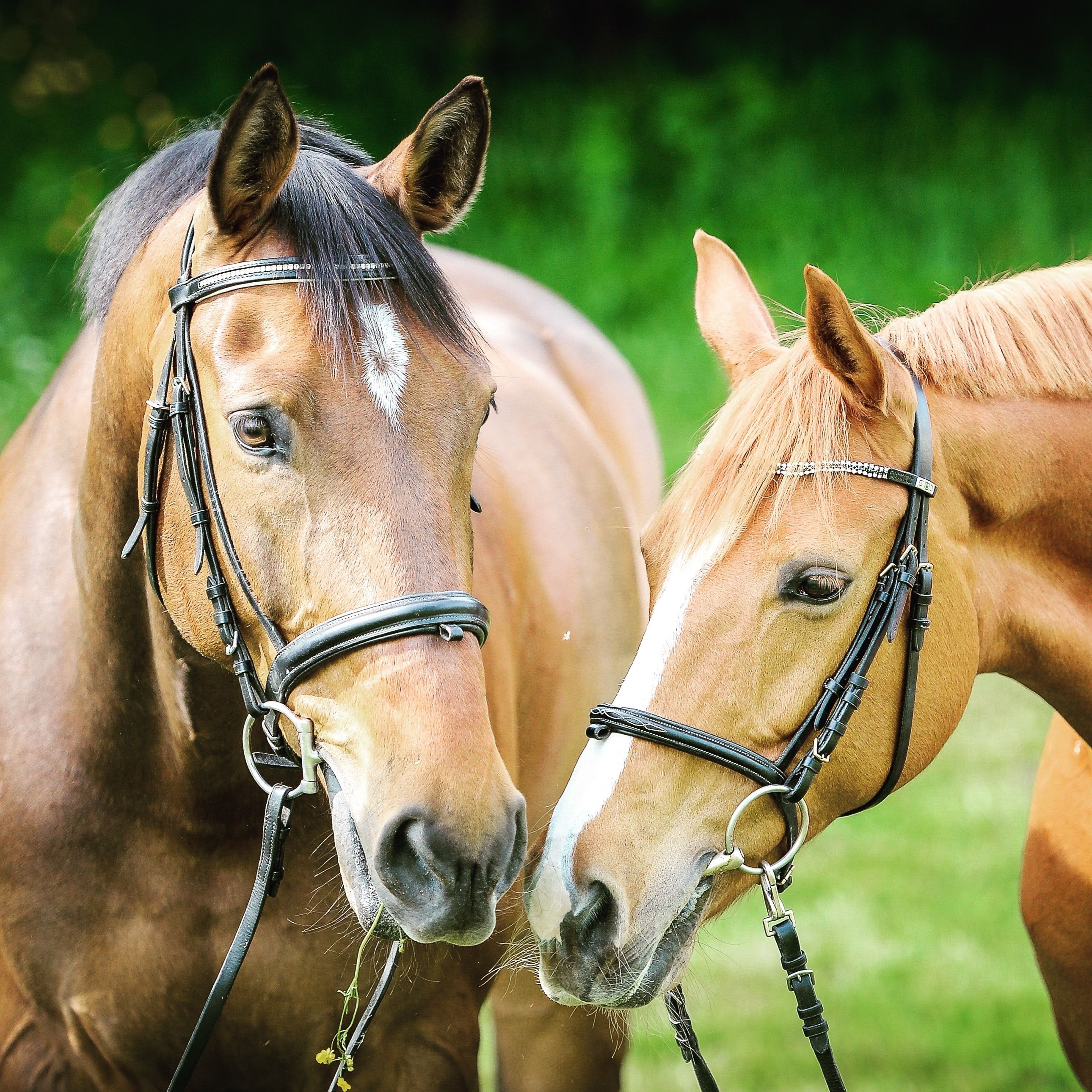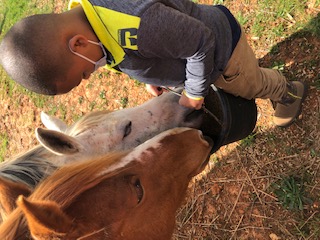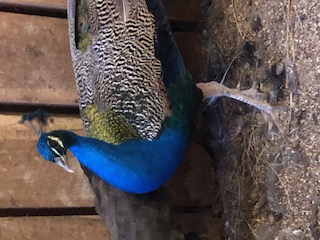By Shay Stinson
Seraaj Family Homes, Inc. is an advocate of nontraditional therapy such as horticulture therapy, play therapy, and animal or pet therapy. Equine therapy, a form of mental health treatment using horses and the bonds created by caring for them which is referred to as hippotherapy, is used often as a form of therapy for people on the autism spectrum. According to Healthline, Media pet therapy is a guided interaction between a person, a trained animal, and its handler to cope and heal from a health issue such as special needs or mental health condition. Benefits of pet therapy include lower blood pressure, reduced stress, and pain alleviation.

Deborah Williams is a Professional Association of Therapeutic Horsemanship International Instructor (PATH).
I interviewed Deborah Williams, the owner of the Step-by-Step Therapeutic Horseback Riding and Petting Zoo in New Market, Alabama near Huntsville, Alabama, about the services offered and farm features, including riding lessons, a petting zoo, and travel exhibits within the community. I was given a tour along with my two children, one of whom is 4 years old. Williams explained that her animals are gentle enough to go and play with the elderly and be petted for hours and they are patient enough to go and be roughhoused with the rambunctious children at the daycares in the area. This makes her animals highly sought by the Huntsville and surrounding communities because they are very friendly and welcoming to people with special needs, younger children, and the elderly.
We saw pigs, emus, lamas, lambs, rams, cows, donkeys, horses, peacocks, hens, roosters, turkeys, miniature horses, dogs, and much more. She names every animal on her farm. They all have family and kinship, and she can tell you the back story to every animal. Williams, who’s also an adoptive parent with her husband, who helps her manage the property, equated this to the importance of youth in foster care knowing their biological family and background.
Williams says that she has many teens that have come to her farm as part of community service programs and alternative behavior programs, and they come back on their own to do more because they find working with animals to be therapeutic. While there, she introduced us to an 18-year-old young man that has been a patron of her farm since he was six years old. He used horseback riding as an extra-curricular activity and is now a competitive rider.
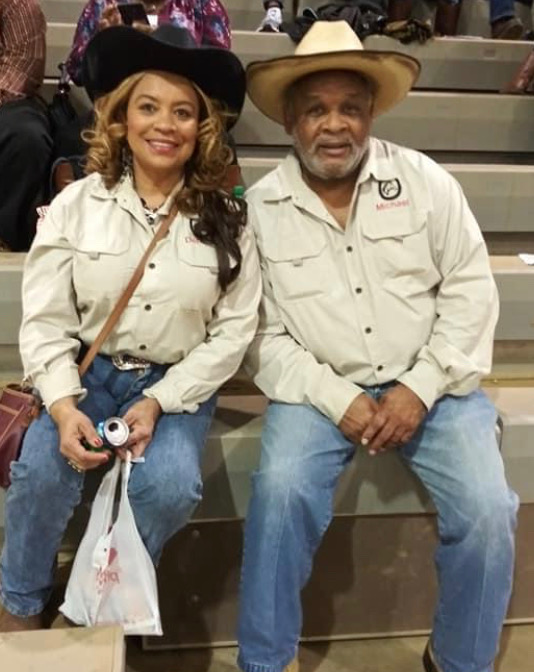
Owner Deborah Williams and husband Michael. The couple travels throughout the country to livestock exhibits and shows.
Here’s my interview with Williams.
Q) Tell us a little bit about your family.
A) My hometown is Ohatchee Alabama. My parents had 11 children (six girls and five boys), I was born the ninth child. We were raised on a farm with lots of chickens, pigs, cows, and goats. I’ve been married to my husband, Michael, for 36 Together our family consists of five children. That’s three girls and two boys. We are Godparents to two children. We also have four grandboys. I graduated from Alabama A&M University, with a major in Business Administration. I graduated from JF Drake cosmetology school and became certified as a PATH (Professional Association Therapeutic Riding) instructor.
Q)How’d you start your farm and business? How’d you get into horseback riding?
A) I was working at my salon in Scottsboro, Alabama and a lady named Farmer was telling me about her horses and how she travels back and forth from Alabama to California with them. I was very impressed with the work she did and the life she lived with her horses, how she learned from them, and how she dealt with them. Then we started volunteering at the horse farm. I started out on my own just raising horses, and I called that venture Williams Stable. When I joined PATH, I changed my [business] name to Step by Step Therapeutic Riders. I have been in business for 15 years and doing the petting zoo for three years.
Q)What benefits would you say working with animals has for children who live with issues like behavior disorders and have mental health needs?
A)Working with kids with disabilities on horseback helps the kids gain confidence and eliminate problems while focusing. Preliminary studies indicate that therapeutic horseback riding has a positive effect on children with attention deficit hyperactivity disorder (ADHD), offering benefits such as staying focused and completing a task. Kids learning how to ride, groom, feed, and interact with horses can have fun and be challenged. It is a hobby they can carry with them into adulthood.
Riding horses also helps to build essential life skills in a safe, supportive environment. Working in a group gives children with ADHD the chance to interact with others kids their own age in a relaxed nonacademic setting. For most adolescents, it helps them uncover parts of themself they may not have had access to in the past if they have been exposed to trauma or been diagnosed with mental illness. Through their interactions with the love and calm animals, teens learn and develop similar soothing, emotionally regulating behaviors. Equine therapy also decreases negative symptoms in adolescents with depression and anxiety. Horses are also helpful supplemental treatment for individuals experiencing psychosis.
Q) How has working with farm animals improved your life and holistic well-being?
A) I love working with animals. It puts me in a place of peace. It puts me in my comfort zone. Being around animals helps me with my depression and anxiety. I get to exercise by riding the horses and walking on the farm.
Q)What are your biggest challenges with getting your business shared with those who need it?
A)The biggest challenge was advertising and trying to get the word out about who we are and what we do. We did social media, yard signs, and we went to nursing homes, daycares, churches, and entered parades.
Q) Have you had experience with many adults that use your farm for therapy?
A) When adults come out to the farmhouse, we help them pick out a help h Sometimes the horse picks them out.
Q) How do you plan to expand what you offer at your farm to reach more people?
A) We plan to hire a professional therapist to assist us with the horses and the therapeutic activities with children.
Q) How can more foster children and foster families benefit from what you offer?

Children who visit Step-by-Step are invited to roam and explore while safely discovering new things.
A) We have over 60 animals out here on the farm. We invite all foster families to visit us. We have plenty of space for the kids to run and play. We can easily be socially distanced. The kids cannot get hurt out here on the farm because we always put safety first. When the foster parents come out here with their children, they will be able to ride the horses and pet all the animals. The animals are very well trained.
Q) You shared with me that you and your family have experience as an adoptive family. If you feel comfortable with sharing this experience, can you please tell me more about this? Tell us how this experience was overall, and would you recommend fostering or adoption to others?
A) I wanted to have five kids but I only had three. [ We thought] the best way to get more kids was to adopt. Before we adopted, we fostered first. Some of the foster children were a little difficult, but we did not give up. We decide to adopt a brother and a sister. We were not used to therapeutic children but we learned to adjust. It was not easy to deal with but we made it work. We only have one child left in the house. We will be an empty nest in one year. What will we do with all this extra time on our hands? We don’t
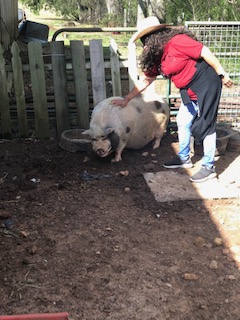
Williams says that the best way to learn about animals is to safely get into their environments and let them lead the way to a friendship.
Equine therapy has many benefits for people of all ages and various needs. Just like Deborah Williams has discovered her entire life, the calming and therapeutic benefits of being in the open air and working hands-on with farm animals are abundant. Williams says she often finds herself walking her property and just taking it all in and praying for ways and ideas to share more of her sanctuary with more people that need this form of therapy. Which to her, means anyone. Step-by-Step offers yearly horse shows, seasonal camps, parties or special events, and programs catering to all ages, and capabilities. They offer programs for disabled veterans and travel around Huntsville and surrounding areas to visit childcare centers and elderly homes. Volunteers are always needed and welcomed at the farm and Williams says she loves to partner with other agencies for health and wellness.

